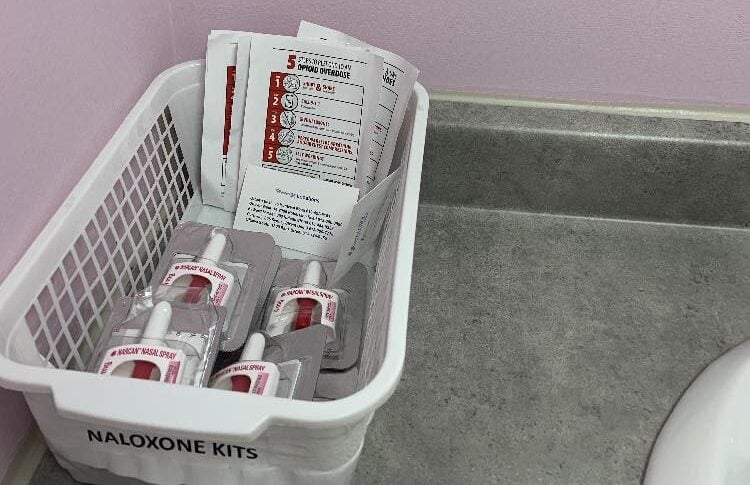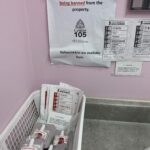Anglican Community Ministries in downtown Ottawa are witnessing the consequences of a provincial government decision to close the Consumption and Treatment Service (CTS) in the Somerset West Community Health Centre on March 31.
The supervised consumption site was one of 10 locations in Ontario closed because they were within 200 metres of a school or daycare. The health centre’s services are changing to become a Homelessness and Addiction Recovery Treatment (HART) Hub, which still provides “basic needs services, including shower facilities, essential supplies, lunch every day, wellness activities and client engagement.” The government has promised that future phases will add direct connections to primary care, mental health support, treatment programs, permanent supportive housing linkages, and rapid referrals to withdrawal management and medical stabilization beds.
Cornerstone Housing for Women has two supportive housing residences in the neighbourhood on Booth and Eccles streets. Senior program manager Ashley Jordan told Crosstalk that Cornerstone and its residents see the effects of the CTS closure close-up in multiple ways.
For some of the residents, “it has been challenging adapting to not having those supports across the street,” she said. “They depended on the community there, so as a result, we are seeing that residents are spending more time isolated in their apartments. … It’s beneficial that they’re living with us because we do still have harm reduction supports here, and we have Naloxone available and so we are able to do increased checks on them to make sure that they are okay and well.”
The CTS closure has not reduced the number of drug users in the neighbourhood, Jordan explained. “They live here, so while they may have closed down the safe consumption site, that doesn’t mean that those people left.” In fact, she said, now that there is no supervised place to use, they are more visible. “We’ve definitely seen an increase in the public presence of people just in front of the building and in our parking lot and just in the community in general…. I’ve definitely seen people using on the streets, and we have witnessed overdoses in the community,” Jordan said.
Drug use is not permitted on Cornerstone’s property, and that means there are increased duties for staff as they to try to monitor the area outside their buildings and sometime rush out to administer Naloxone to people who have overdosed.
“We will do what we can to support people and support the community, but we are definitely concerned … because the opioid epidemic is not going away anytime soon,” she said. “Unfortunately, the reality is that people will die as a result of the closure of safe consumption sites.”
Another safety concern is that there’s been an increase in materials such as needles found on the ground and in public spaces, Jordan said. She noted, however, that there is a needle exchange box at Cornerstone’s Booth street residence that anyone can access. It is maintained in partnership with the City.
Belong Ottawa’s locations have seen big increases in demand for their day program services since the CTS closure.
The Bronson Centre, where St. Luke’s Table relocated after a 2022 fire at St. Luke’s church, reports a significant surge in service users. Breakfast numbers have doubled, and there has been a notable increase in the demand for lunch services. The use of cots and respite spaces has also risen substantially. When cots are unavailable, service users are resorting to sleeping on the floor. Many of the new participants are individuals previously unknown to the service system, indicating a shift in the population accessing support.
Similarly, Centre 454 has seen a substantial increase in the number of new service users. They report that staff have had to acclimatize these new individuals to the centre’s expectations and guidelines, including the maintenance of a substance-free environment on the property.
Monica Patten, chair of the Community Ministries Committee for the Anglican Diocese of Ottawa, says the closure of the CTS at Somerset increases pressure at Belong Ottawa and Cornerstone. In terms of staffing, she said, “We’ve never fully recovered from COVID…Staff are stressed and overstretched. It’s hard to fill positions on an ongoing basis because this is hard work…and when a service that is really helpful gets shut down, our work gets harder. And I think that that’s part of what we’re facing in our community in general and in community ministries, as well as other frontline organizations.”
Patten acknowledged that the CTS did pose concerns for people around it. “It wasn’t a panacea, but it was work that broke a little bit of the tension that’s out there, made it possible for people to consume safely.” She added that she feels that many people in the community, even Anglicans here in the diocese, don’t know the depth of what is happening in community ministries. “They know that we provide meals, but it’s so much more,” she said. People “go for lunch, sure, but that lunch is only part of how they are healed and loved and supported.
“At the centre of the story is compassion,” Patten said. “These are not just social service ministries. These are ministries that save lives. They save lives through their compassion, through offering nutrition, through offering safe places.”



Week of Prayer for Christian Unity annual service to be celebrated at Saint Paul University on Jan. 22